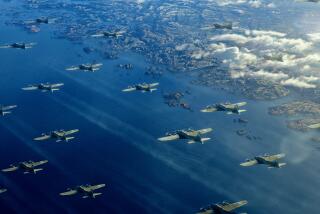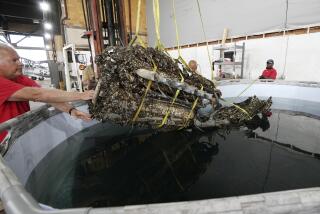Bombs Blamed for Glenn Miller’s Death
- Share via
NEW YORK — Two Royal Air Force veterans say they fear that bombs they jettisoned over the English Channel after an aborted World War II mission may have accidentally downed the aircraft carrying famous band leader Glenn Miller, it was reported Tuesday.
The navigator and the pilot of the RAF bomber said they saw a Norseman aircraft fall into the channel below them as the bombs exploded on Dec. 15, 1944, apparently knocked from the sky by shock waves, the New York Times reported.
Miller was flying in a Norseman D-64 that disappeared over the channel in foggy weather that day. At the time, he was a major in the Army and leader of the Army-Air Force band.
Ice on Wings Blamed
His plane had taken off from an airfield near Bedford, England, on a flight to Paris, where he was to give a show. Official reports on the disappearance indicated that ice on the plane’s wings may have disabled the craft.
The bomb theory was first raised in public last year by Fred Shaw, the navigator, who now lives in South Africa. However, it was discounted on the grounds that no RAF plane was in the air that day because of the poor weather.
However, further investigation turned up records at Britain’s Ministry of Defense, which confirmed that a squadron of Lancasters had taken off at noon on Dec. 15, 1944, and had flown on a course over northern France, near the Belgian border, on a mission to attack the railway yards in nearby Siegen, Germany, the New York Times said.
No Flight Plan
The Miller flight took off from Twinwood Farm, near Bedford, 50 miles northwest of London, at 1:55 p.m. Greenwich War Time, but the pilot filed no flight plan and his course is unknown, the newspaper reported.
The pilot of the RAF plane, Victory Gregory, who now lives in Westonsuper-Mare, England, confirmed Shaw’s story, the paper said.
“The rear gunner, who was looking around all the time, saw it (the Norseman aircraft) tip up and go into the sea,” Gregory recalled.
When asked why he did not come forward sooner, Gregory said he thought little of the incident at the time.
“My own concern was getting my airplane home safely. We were fighting a war, and we lost thousands of planes,” he said.
More to Read
Sign up for Essential California
The most important California stories and recommendations in your inbox every morning.
You may occasionally receive promotional content from the Los Angeles Times.













